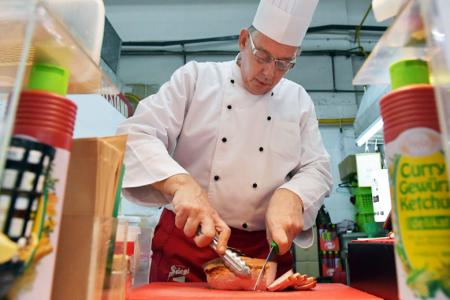Freebies and discounts are ammunition in the battle against plastic
The casual use of plastic disposables is embedded in many Singaporeans' lives, from bags at supermarkets to cutlery when eating takeaway food.
A group of 14 retailers hopes to change that under a campaign. Over the next four months, they are dangling discounts and freebies to encourage customers to bring their own bag, bottle or container.
For instance, supermarket chain Cold Storage is giving reusable bags this month to customers who bring their own bag and spend at least $20, among other conditions.
It joins FairPrice, which already gives customers using reusable bags a 10-cent discount with a minimum $10 purchase.
Other participating retailers include cafe chains Joe & Dough and PAUL, as well as German sausage stall Wuerstelstand in Dover. Wuerstelstand gives a 50-cent discount to customers who bring reusable containers for takeaway meals.
But while the campaign marks an important step towards cutting down on the use of plastic - Singapore's most common type of waste - it has also underscored how the habit remains a tough one to break.
Mr Eugene Tay, executive director of non-governmental organisation Zero Waste Singapore, which launched the Bring Your Own campaign on Thursday (Aug 31), said it had actually approached some 200 retailers in the past five months to be a part of the campaign, but just 14 agreed.
The majority remain seated on the fence as they are worried about increasing their operational costs or how customers bringing reusable bottles and containers would affect daily sales operations.
However, Mr Erich Sollbock, 56, owner of Wuerstelstand, said the savings from reduced use of disposables will eventually pay for the 50-cent incentive he gives to customers. "I have independently made it my SOP (standard operating procedure) not to automatically provide plastic disposables to my customers."
Mr Tay remains optimistic, aiming to sign up 500 retail outlets and reduce the number of disposable items by a million pieces by the end of this year. The 14 retailers currently operate about 220 outlets.
"After some time, this habit should hopefully continue even without retailers providing incentives," said Mr Tay.
Some smaller retailers such as Wuerstelstand and Verdure Cafe said they will make it a permanent effort beyond the campaign. Cold Storage said it will decide based on the public reception.
Singapore generated some 822,200 tonnes of plastic waste last year, with only 7 per cent of it recycled. The burning of plastic produces carbon dioxide which contributes to the warming of the planet.
Ms Melissa Tan, chairman of the Waste Management and Recycling Association of Singapore, said the campaign could not have come sooner. She noted that some local waste collectors and recyclers collect plastic waste, but export them to other countries for recycling. "Unfortunately, even some of these countries are finding it hard to cope with so much plastic waste."
She suggests Singapore could also consider a plastic bag tax, such as in places like Hong Kong where HK$0.50 (S$0.09) is charged per plastic bag. The number of plastic bags disposed of in Hong Kong landfills dropped 25 per cent from 5.2 billion in 2014 to 3.9 billion in 2015.
But the common complaint from consumers here about charging for plastic bags is that they need them to bag their rubbish, said Mr Tay.
Administrator R. Sumity, 50, said: "It's not a good idea. It will add to my living cost if I have to also pay for plastic bags now to bag my rubbish."
But Mr Tay said plastic packaging that come with food products such as bread can be used instead.
Others are more open to change. Said retired engineer Dan Chen, 67: "It will just become a habit over time to bring my own bag. I guess I will also use my plastic bags more carefully if I have to pay for them."
Get The New Paper on your phone with the free TNP app. Download from the Apple App Store or Google Play Store now



